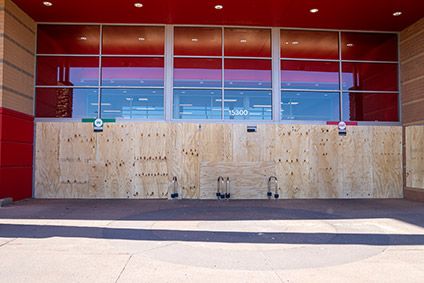
Adidas and Target Corp are among a number of retailers in the US to have closed stores or postponed openings in response to the civil unrest taking place across the country over the killing of George Floyd by a white police officer.
In an update on its website yesterday (2 June), US retailer Target said it was closing six stores in California Minneapolis, Philadelphia, Illinois and Georgia. The company’s store in Lake Street, Minneapolis, near where Floyd was killed, is having to be rebuilt and is expected to open later in 2020.
“We are now boarding the store up until we can survey the location and begin recovery efforts,” Target said.
A spokesperson for the retailer added: “Like many businesses, we are making the decision to reduce hours or temporarily close stores for the safety of team members and guests. We anticipate most closures will be temporary. We are not providing a count on the number of stores impacted by reduced hours or temporary closures as the situation remains incredibly dynamic.”
Target said its staff impacted by store closures will be paid for up to 14 days of scheduled hours and will be able to work at other nearby stores.
Sportswear giant Adidas, meanwhile, has closed all 230 of its US stores until further notice, just weeks after reopening them for the first time in months due to the coronavirus pandemic.

US Tariffs are shifting - will you react or anticipate?
Don’t let policy changes catch you off guard. Stay proactive with real-time data and expert analysis.
By GlobalDataA spokesperson for the company said: “We can confirm some Adidas stores in the US were damaged during the protests across the country. We’ve made the decision to close all US retail stores until further notice.”
Meanwhile, Amazon is understood to have adjusted some of its routes and scaled back its operations in a number of cities. Macy’s flagship store in Herald Square, New York, is said to have been ransacked, and luxury stores on Fifth Avenue have been vandalised, the Financial Times has reported.
The closures come as the retail industry was beginning to emerge from the economic crisis caused by the Covid-19 pandemic. Many are having to step up security and transfer merchandise to more secure locations in the meantime.
Matthew Shay, CEO of the National Retail Federation (NRF), said communities were right to express their “anger and frustration through peaceful protests over the unjustifiable death of George Floyd”.
But he said defacing, looting and plundering businesses, whether viewed as a direct outgrowth of fury or an opportunistic act of vandalism and theft, impedes progress and healing.
“Of primary concern to our retailers is the safety of their teams, the communities they serve and the emotional and physical well-being of their African American colleagues and customers. Retailers are committed to the values of diversity, inclusion and opportunity and that has always been at the heart of our industry. The actions of a few are impacting not just stores, but also putting at risk the people who work and shop there.”
A number of retail leaders have stepped forward in recent days to issue statements on the death of Floyd and what their companies are doing to address racism and equality.
VF’s CEO Steve Rendle said racism is not welcome at VF Corporation.
“It never has been and never will be. And while we as a company can’t create a vaccine to eradicate racism from our planet, we can do our part to lead with purpose, inspire others with our actions, break down racial and ethnic barriers and be part of the solution.”
With immediate effect, Rendle said the company and its brands will speak out against racism and engage its associates and external audiences in “positive, productive dialogue”.
“Our inclusion and diversity team will create virtual venues for us to gather, discuss and express our emotions, which are understandably high right now. We will activate our Employee Resource Groups in ways that elevate this topic to a higher degree internally, and we will leverage our Executive Inclusion and Diversity Council so we can understand what other actions we should be taking to support our people.”
Jide Zeitlin, CEO of Tapestry, issued a statement on Linkedin to say the company is working through a plan with the help of leaders across the organisation.
“We want to convene a number of social justice, legal, and corporate entities to formulate a longer-term plan for addressing systemic inequality. Inequality in health, economic opportunity, public safety, and other sectors. We hope to join with government, but events of this past week make it clear that we cannot wait.
“Our three brands—Coach, Kate Spade, Stuart Weitzman—were each founded in New York City. They were formed in part by this city’s diversity. By the creativity that is sparked by deliberate and random intertwining of divergent people and ideas. Emboldened by the role that positive tension plays in driving growth. We understand that we are better together when different life experiences and perspectives allow us to develop ideas and products that none of us could have come up with on our own. What I’ve heard very clearly from so many of you is the visceral importance of inclusion to you. The belief that inclusion makes you better by allowing you to fully show up at work as yourself. And that inclusion makes us better as we tap into a greater depth of your experience and perspectives.”




